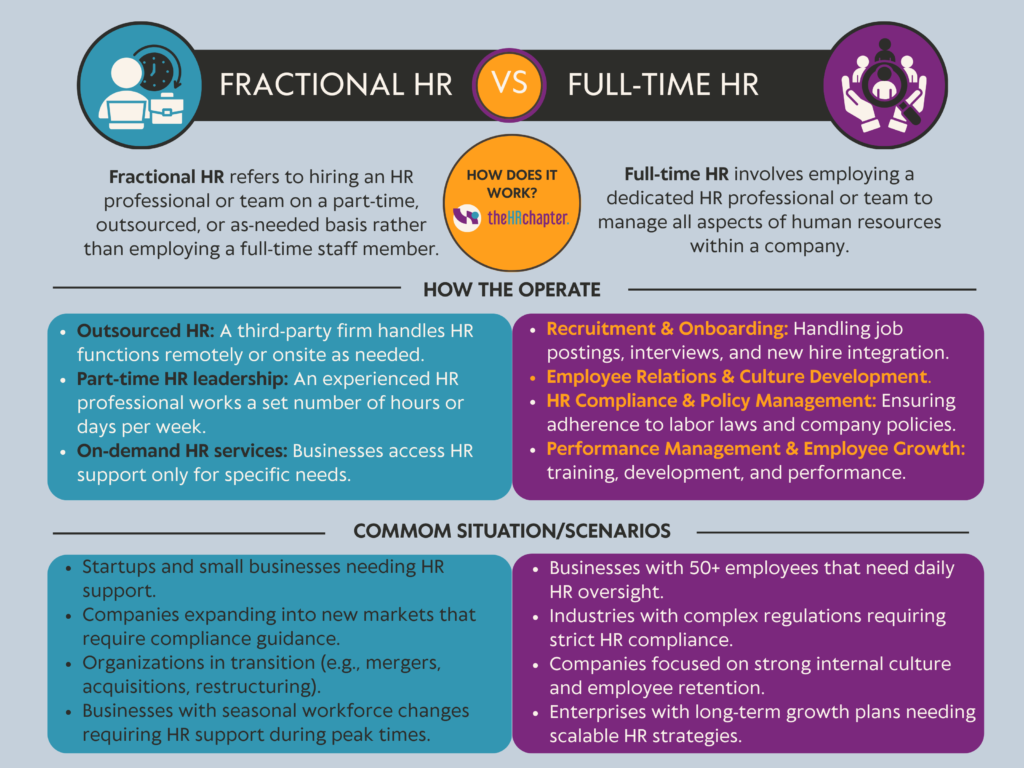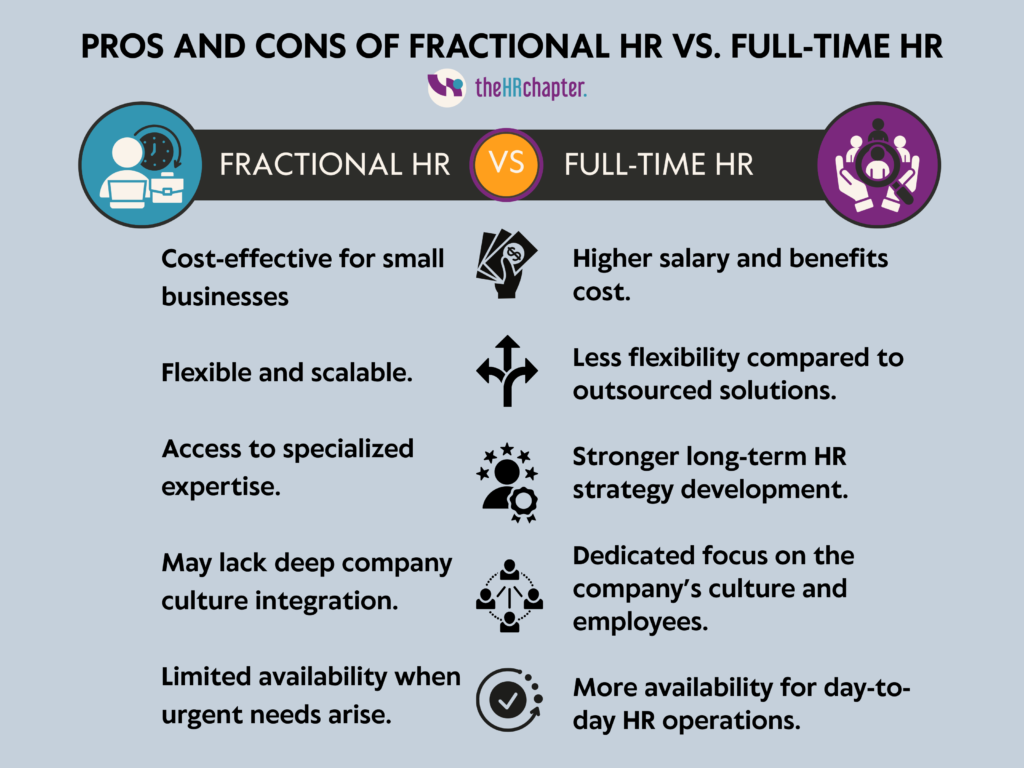HR Solutions for Small Businesses: Fractional vs. Full-Time HR Compared

Human Resources (HR) is a critical function in any business, responsible for managing employee relations, hiring, compliance, payroll, and company culture. As companies grow and enter new markets, they often face a key challenge—how to effectively manage HR while balancing compliance with local laws and maintaining cost efficiency.
For many growing businesses, hiring a full-time HR team may not be the most practical option right away. This is where fractional HR professionals come into play. They offer specialized HR support on a flexible, part-time, or on-demand basis, assisting businesses with short-term needs like adapting to company culture, optimizing recruitment processes, and maintaining compliance with labor laws.
But how do you decide which HR model—fractional or full-time—is the right fit for your business? In this article, TheHRchapter will explore the benefits and drawbacks of both approaches, helping you determine the best HR solution for your growing company.
Understanding fractional HR and full-time HR
As businesses grow, they must decide how to manage their human resources effectively. Some opt for fractional HR, a flexible and cost-effective solution, while others invest in full-time HR, ensuring a dedicated approach to workforce management. Choosing the right model depends on the company’s size, needs, and long-term goals.
Fractional HR refers to hiring an HR professional or team on a part-time, outsourced, or as-needed basis rather than employing a full-time staff member. These professionals offer expertise in HR strategy, compliance, hiring, and employee relations without the overhead costs associated with a full-time salary and benefits package. This option is ideal for businesses that need specialized HR support without committing to a full-time hire.
On the other hand, full-time HR involves employing a dedicated HR professional or team to oversee all aspects of human resources within a company. This model ensures continuous support for employee relations, compliance, hiring, training, and workforce strategy, making it a suitable choice for organizations with more complex and ongoing HR needs.
Below, we break down how each model works and when businesses might choose one over the other.

Pros and cons of fractional HR vs. Full-time HR
Choosing between fractional HR and full-time HR depends on a business’s size, budget, and operational needs. Both models offer unique advantages and drawbacks that companies must consider before deciding which HR approach best aligns with their goals.
• Fractional HR offers a cost-effective, flexible, and scalable solution for businesses that need professional HR support without the financial commitment of a full-time hire. It provides access to specialized expertise across various industries, making it ideal for startups, seasonal businesses, and companies in transition. However, fractional HR professionals may struggle with deep company culture integration and may not always be available for urgent HR issues, as they work on a scheduled basis rather than being fully embedded in the organization.
• Full-time HR provides a dedicated focus on company culture, employee engagement, and long-term HR strategy development, making it ideal for businesses with ongoing workforce needs. With an in-house HR team, companies benefit from immediate availability for daily operations, compliance issues, and employee concerns. However, this model comes with higher salary and benefits costs and may lack the flexibility of outsourced solutions, making it less adaptable to fluctuating HR demands.

Key factors to consider when choosing between fractional and full-time HR
1. Business Size and Growth Stage: Small startups and early-stage businesses often benefit from fractional HR, as they require expert guidance on hiring, compliance, and policies without the cost of a full-time professional. In contrast, scaling companies with an expanding workforce may need a full-time HR presence to manage employee relations, company culture, and long-term workforce planning effectively.
2. Budget Considerations: Fractional HR is a cost-effective option for smaller businesses, providing expert support without the expense of full-time salaries, benefits, and operational costs. In contrast, full-time HR requires a higher financial commitment, including salaries and training, making it more suitable for companies that can justify the investment based on their workforce size and HR needs.
3. HR Needs Complexity: Fractional HR can efficiently handle basic functions like recruiting, onboarding, and compliance support. However, businesses with more complex HR requirements, such as benefits administration, payroll management, and employee engagement strategies, may need a full-time HR professional for consistent oversight and long-term stability.
4. Industry-Specific Requirements: Highly regulated industries like healthcare, finance, and manufacturing often need full-time HR professionals to ensure compliance with labor laws and safety regulations. In contrast, less regulated industries, such as tech startups and consulting firms, can often rely on fractional HR for recruitment, compliance, and culture-building support.
5. Long-Term vs. Short-Term Goals: Fractional HR is well-suited for short-term needs like hiring bursts, policy updates, and compliance reviews. However, long-term HR strategies, such as employee retention, leadership development, and organizational culture-building, typically require a full-time HR presence to ensure consistency and long-term success.
When should you choose fractional HR or full-time HR?
Selecting the right HR model depends on a company’s size, needs, and long-term goals. While fractional HR provides flexible, cost-effective support, full-time HR ensures dedicated oversight and strategic workforce development. Here’s when each option makes the most sense.
When fractional HR is the right choice
• You’re a startup or small business with limited HR needs – Early-stage companies often require occasional HR guidance rather than a full-time professional. Fractional HR provides essential support without a long-term commitment.
• You need specialized HR expertise temporarily – If your business is going through a transition, such as expansion, restructuring, or compliance updates, fractional HR can offer targeted, expert assistance.
• You want to keep costs low but still stay compliant – Hiring a full-time HR team can be expensive. Fractional HR allows businesses to maintain compliance and HR best practices without the financial burden of full-time salaries and benefits.
When full-time HR is the right choice
• You have a growing workforce with increasing HR demands – Once a company reaches around 50+ employees, day-to-day HR operations, employee relations, and compliance become more complex, requiring a dedicated HR presence.
• You need a long-term HR strategy and employee development programs – Companies focused on talent retention, leadership training, and workforce planning benefit from full-time HR professionals who can build and implement long-term strategies.
• Your company culture requires hands-on HR involvement – Businesses that prioritize strong employee engagement, workplace culture, and real-time HR support often need an in-house HR team to foster meaningful connections with employees.
Looking for guidance in selecting the best HR solution for your business?
Choosing between fractional HR and full-time HR is a crucial decision that impacts your company’s growth, culture, and compliance. If your business needs flexibility, cost-effective support, and specialized expertise, fractional HR may be the right fit. However, if you require dedicated, hands-on HR leadership and long-term workforce strategy, a full-time HR team might be the better choice.
At TheHRchapter, we understand that every business has unique HR needs. Whether you’re a startup looking for expert guidance or a growing company in need of a structured HR strategy, we can help you find the best solution. Contact us today to explore how our HR expertise can support your business at every stage of growth.
Need help with other HR services for your business?
At TheHRchapter, we provide tailored solutions to guide startups and scaleups in choosing and implementing the best tools for hiring, onboarding, payroll, employee management and more.
Core HR Services
- HR Consulting: Provides expert advice on various HR matters, including policies, procedures, and compliance
- HR Services for Startups: Offers tailored solutions for startups, helping them establish a strong HR foundation.
- Payroll Services: Manages payroll processing, tax filings, and employee benefits.
Let us help you streamline your HR processes and achieve your business goals. Contact us today to get started!
Spread the Word!
Enjoyed what you’ve read? Help others discover it too! 📢 Share this article and let’s keep the discussion going.
Related Reads: Check out these other Articles!
Expanding to Europe? Why Hiring Is Where Scale Usually Breaks (and How to Fix It Early)
Expanding to Europe? Why Hiring Is Where Scale Usually Breaks (and How to Fix It…
Agentic AI and HR Ethics: Best practices and ensuring compliance for employees and candidates
Agentic AI and HR Ethics: Best practices and ensuring compliance for employees and candidates There’s…
2025: The Year HR Became Strategic – Key Lessons and Insights for HR Leaders
2025: The Year HR Became Strategic – Key Lessons and Insights for HR Leaders 2025…



